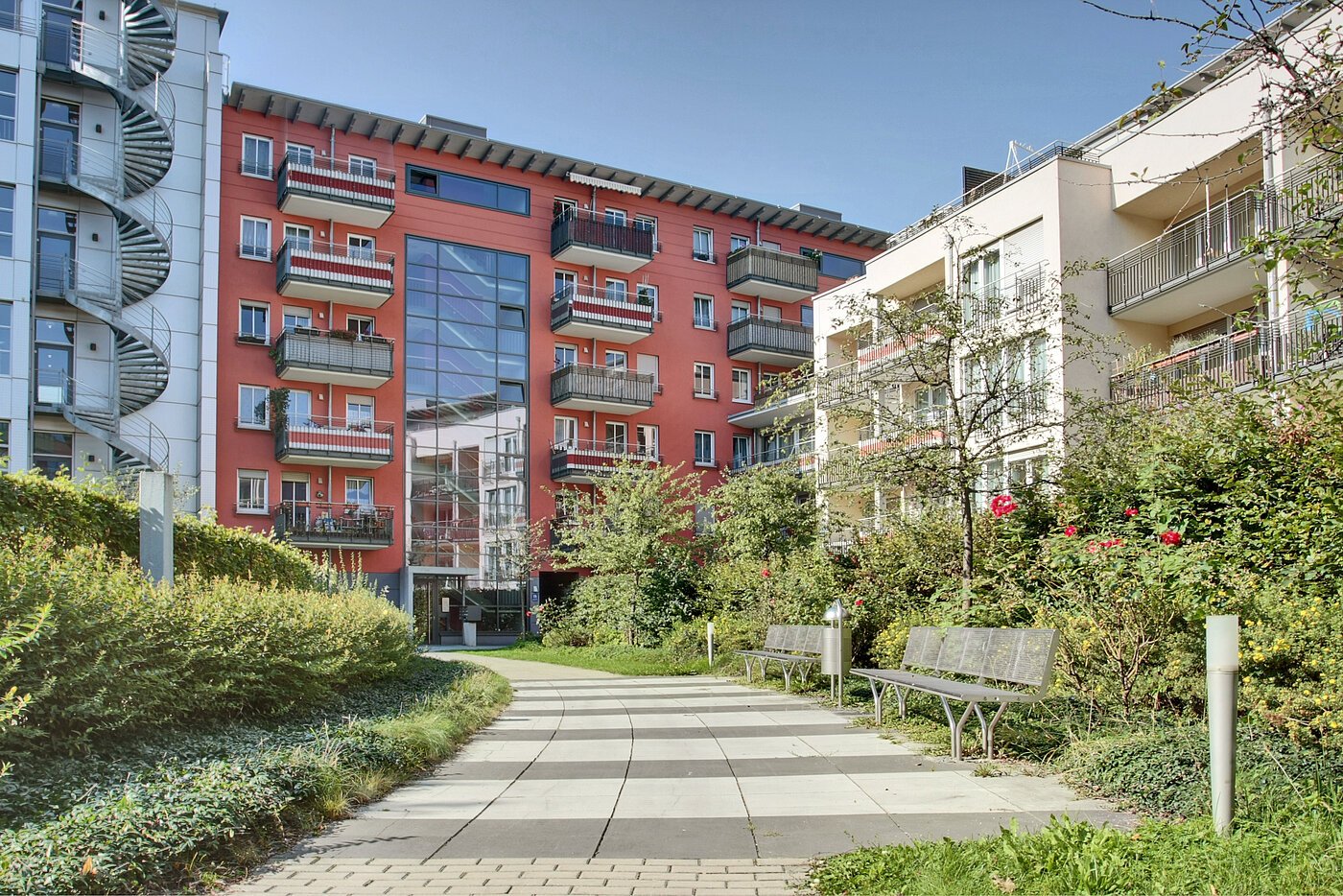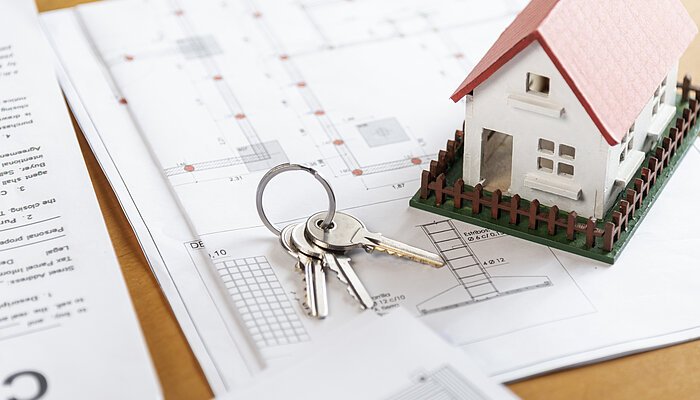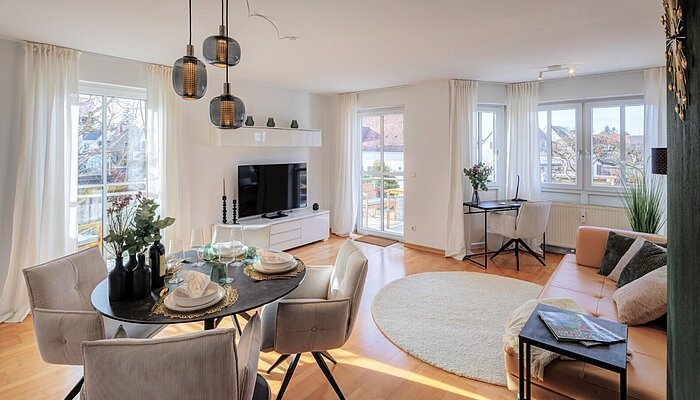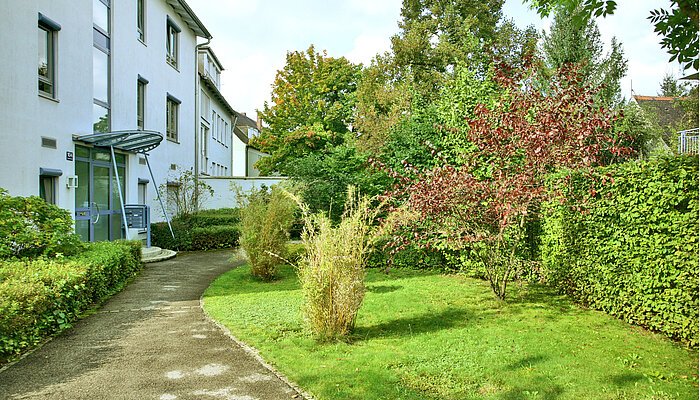Income capitalization approach Munich - property valuation for investors and sellers
The property valuation is one of the most decisive steps when selling, buying or investing in a property - especially if it is rented out and serves as an investment. After all, it is not the emotional value that counts, but the objectively determined market value, which often influences decisions worth millions. The income capitalization approach plays a central role in this context: it does not value properties according to construction costs or comparative prices, but according to their economic performance - i.e. according to the expected rental income. As one of the leading real estate companies in Munich with over 30 years of experience in the valuation and sale of residential and capital investments, Mr. Lodge knows what really matters when it comes to valuation. We regularly assist owners, investors and project developers in valuing their properties in line with the market. Find out here what is behind the income capitalization approach - and why, especially in a complex metropolitan region like Munich, sound market knowledge is the key to a correct valuation.
Table of contents:
The income capitalization approach is one of three officially recognized methods for determining the value of real estate in Germany. It is primarily used for yield-oriented properties, i.e. properties that generate income through letting or leasing. In contrast to other methods, the income capitalization approach does not primarily look at the net asset value of the property, but at the future income that can be expected from the property. Put simply, the value of a property is derived from its income.
In practice, the income capitalization approach is used in particular for rental properties (e.g. apartment buildings) and commercial properties where the property value is largely determined by rental income. The procedure is regulated in §§ 27-34 of the Real Estate Valuation Ordinance (ImmoWertV) and forms a central basis for determining the market value of such investment properties.
"An accurate valuation is the basis for a successful sale. Especially for investment properties in a booming city like Munich, the income capitalization approach is often the key to determining a realistic market value and achieving a fair market price," explains Norbert Verbücheln, Managing Director of Mr. Lodge.
When determining the value using the income capitalization approach, the focus is on two components: land value and building income value. If both are added together, the result is the capitalized earnings value, i.e. the projected market value of the property.
- Land value: The land value corresponds to the value of the undeveloped plot of land. This is usually determined on the basis of standard land values, which indicate the price per square meter for land in a comparable location.
- Building income value: The building income value represents the value attributable to the building fabric from the income of the property. To calculate this, the annual gross income (rental income per year) is adjusted for ongoing management costs (e.g. maintenance, administration), resulting in the net income of the property. The so-called return on land value is then deducted - this is the amount that could be achieved if interest were paid on the land value. What remains is the building net income, which is multiplied by a multiplier (depending on the remaining useful life and the standard market property interest rate). The result of this capitalization is the building income value.
The property interest rate plays a central role in this procedure: it reflects the standard market interest rate for real estate investments and is derived by the expert committee on the basis of purchase price/rent ratios. A low property interest rate (e.g. in highly sought-after locations) leads to higher income values, while a higher interest rate depresses the income value - because a buyer would want to pay less for the same rental income if the market had high yield expectations. The result of the income capitalization approach is correspondingly sensitive to changes in rents or interest rates: rising rental income increases the income value, while rising interest rates (higher property interest) can reduce the calculated value.
Tip: A well-maintained property and rents in line with the market can significantly increase the capitalized earnings value. Modernization, avoiding vacancies and optimizing management can increase the annual net income - and thus also the building's income value, which ultimately results in a higher sales price.
The purchase prices for residential real estate in Munich are high in relation to the achievable rents. In the past, this has led to extremely low yields: The average property interest rate for apartment buildings in Munich in 2022, for example, was only around 1.4% in some cases. Such a low interest rate reflects enormous purchase prices in relation to rental income (yield factor of over 30). For investors, this meant that investment properties in Munich generated comparatively low current yields for a long time.
However, the market is currently undergoing a change. With rising interest rates and slight price corrections, the key figures have normalized somewhat: In fall 2024, the average property yield in Munich was around 2.7%. Multi-family homes offer slightly better yield prospects again due to higher rents and moderately lower purchase prices. In concrete terms, this means that with a higher property interest rate, the calculated multiplier is lower, which tends to lead to lower (more realistic) income values - the market value is approaching what investors are prepared to pay with higher interest rates. Nevertheless, Munich remains a market for investors with relatively low initial yields but stable performance.
"Munich is a special market. Despite high prices, capital investments here offer long-term security," says Norbert Verbücheln. "Our expertise in price and market developments in Munich and the surrounding area helps owners and investors to know the realistic market value of their property and make informed decisions."
Not every property in Munich is valued using the income capitalization approach. There are three recognized methods in Germany: the comparative value method, the asset value method and the capitalized earnings value method. Each method has specific areas of application:
- The comparative value method compares sales prices of similar properties and is often used for condominiums or unrented single-family homes, provided sufficient comparative data is available.
- The asset value method determines the value using the asset value (land value + construction costs less depreciation) and is mainly used for owner-occupied houses or unique properties where income and comparative prices do not play a major role.
- As described, the income capitalization approach is the preferred method for investment properties, i.e. rented residential and commercial properties, because the income component is the main focus here.
Experienced property valuers such as Mr. Lodge choose the appropriate method depending on the property - or combine several methods to determine the realistic market value. Particularly in complex cases (e.g. mixed properties), a combination of comparative and income approaches can be useful in order to obtain a coherent overall picture. It is important that the chosen method does justice to the characteristics of the property and takes current market data into account.
Note: In Munich, the income factors (ratio of purchase price to annual rent) were extremely high for years. In 2022, the multiple of the gross yield reached its peak value, since then it has fallen slightly - in the first three quarters of 2024, the average yield factor was around 31, comparable to 2015. At the same time, the property interest rate rose again from historic lows of 1.4 % to around 2.7 %. For owners, this means that income capitalization valuations are currently changing: Higher interest rates mean that the calculated values are slightly lower than in 2022, while rising rents mitigate the effect. Ongoing market observation is therefore essential, especially in Munich.
Valuing a property is complex - especially in Munich, where market knowledge is worth its weight in gold. As one of Munich's leading real estate agents with over 30 years of experience, Mr. Lodge knows the local market inside out. Our real estate agents are experts in valuations and property sales and have extensive regional market knowledge. This knowledge advantage is crucial for valuing properties in line with the market and selling them successfully.
"At Mr. Lodge, we combine many years of experience with in-depth market expertise for Munich and the surrounding area," emphasizes Norbert Verbücheln. "As experts in capital investments and real estate investments, we know what is important to investors. We keep a close eye on price and market developments and can therefore determine and realize the optimum market value for our clients."
At Mr. Lodge, you receive a professional property valuation according to modern standards - free of charge and without obligation as an initial consultation. Our service includes not only the calculation according to the income capitalization, comparative or asset value method, but also an individual classification of the results in the current market. In this way, we ensure that no aspect is left unconsidered: from the quality of the location to supply and demand to the expectations of potential buyers. Ultimately, what counts for us is to achieve a sales price in line with the market for you.
-
How does a vacancy affect the capitalized earnings value?
A vacancy reduces the expected rental income and therefore directly reduces the net income, which forms the basis of the income capitalization approach. The higher the vacancy rate, the lower the building's income value - and therefore the overall value of the property. For investors in particular, the risk of vacancy is a critical factor in the valuation. Anyone wishing to sell a property should therefore ensure that the rental situation is as good as possible. Short, fixed-term rental agreements can also lead to discounts as they create uncertainty.</p
-
Why is the property interest rate so important in the income capitalization approach?
The property interest rate is a market-based indicator that shows the return a buyer expects on a real estate investment. It directly influences the multiplier with which the net income is capitalized - i.e. the ultimately calculated building value. A low interest rate leads to a high capitalized earnings value, a high interest rate reduces it. In Munich in particular, small changes in the property interest rate are noticeable, as the valuation level is very high. The correct assessment requires sound market knowledge and up-to-date comparative data.</p
-
What role does the remaining useful life play in the income capitalization approach?
The remaining useful life describes the period in which the building can be used in an economically viable manner. It influences the capitalization factor: the longer the remaining useful life, the higher the multiplier - and therefore also the capitalized earnings value. Modernization or energy-efficient refurbishment can extend this useful life and increase the value. Conversely, structural damage or outdated technology reduce the capitalized earnings value, as they shorten the economic life.</p
-
Can the income capitalization approach also be used for mixed-use properties?
Yes, the income capitalization approach is well suited to mixed-use properties, e.g. houses with commercial space on the first floor and apartments above. The income is calculated separately according to the type of use, as commercial space usually has different rental income, management costs and property interest than residential space. The capitalized earnings value is then combined from the partial values of both types of use. Such properties are particularly common in Munich - a precise and differentiated valuation is especially important here.</p
-
How current must the rental income be for a valuation?
For a realistic income value calculation, the rental income must be up to date. Outdated rental agreements with below-average rents can artificially lower the value. Likewise, a planned rent increase can only be taken into account if it is legally enforceable. The rent level in Munich is high, so it is worth checking the rent before a valuation and adjusting it if necessary. Index-linked rental agreements or graduated agreements should also be included correctly.</p
-
What are the advantages of an assessment by a regional expert like Mr. Lodge?
A regional real estate expert like Mr. Lodge knows the specifics of the Munich market inside out - from micro-locations to current trends in rents and purchase prices. This is particularly crucial for the income capitalization approach, as the assessment of property interest rates, management costs and yield expectations depends heavily on the local environment. In addition, many years of experience with actual transactions flow into the valuation. As a result, owners and investors not only receive a calculated value, but also a well-founded market analysis with recommendations for action. This creates security - for example when selling, financing or making investment decisions.</p

Contact us if you have any questions about buying real estate
.Tel.: 089 340 823-540 | verkauf@mrlodge.de
Jacqueline Sauren
Head of Real Estate Sales







